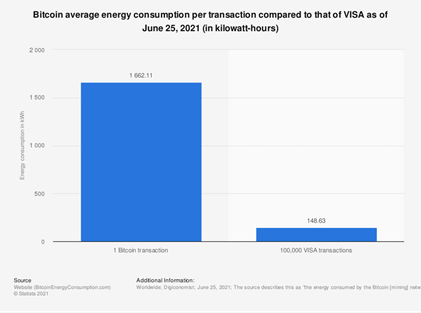The Environmental Impact of Blockchain Technology
Cryptocurrency, Blockchain, Bitcoin, data mining, … These trending buzz words can be heard virtually everywhere: In financial discussions, the business world, universities and so many more instances.
But what do these terms actually mean? And how do they impact the climate crisis?
Back to Basics
In order to try and answer these questions, we need to gain a better understanding of the basics.
As a whole, cryptocurrencies, in contrast to traditional currencies, are not backed by tangible assets or securities – at least one part maintains real support.
They are digital currencies that are generally not issued by governments – therefore unregulated – and are secured by cryptography, a method of storing and transmitting data in a particular form so that only those for whom it is intended can read and process it. It protects data from theft or alteration, but can also be used for user authentication.
Many of the cryptocurrencies are based on blockchain technology: “a distributed ledger enforced by a disparate network of computers”.
Cryptocurrencies are usually traded but can also be used to buy goods and services.
Bitcoin, the most popular cryptocurrency, has had very volatile prices, often losing or gaining in value in short periods of time. This volatility also presents several challenges, however it’s out of our article scope.
The Energy-Hungry Technology
Instead, we want to focus on the environmental impact of blockchain technologies that are the backbone of cryptocurrencies such as Bitcoin, Ethereum, XRP, Cardano or Stellar, among others.
For this, let’s take a look at how blockchain works. Simply put, it is decentralized and manages transactions and records them. Once recorded, data cannot be altered.
One aspect of this technology is the process of data mining, where the network of computers uses algorithms to confirm transactions.
The environment comes into play when looking at the high-speed computers that form part of the network. Naturally, these consume a huge amount of energy.
In fact, according to the University of Cambridge Electricity Consumption Index, if it were a country, the Bitcoin system alone would be the 34th largest consumer of electricity.
Criticism Is Increasing
This shocking fact highlights the environmental cost that is often overlooked.
However, public figures are starting to acknowledge the impact by refusing to accept Bitcoin as payment until the carbon footprint is improved.
Vitalik Buterin, the creator of the second largest cryptocurrency called “Ethereum” also mentions his concerns regarding the carbon footprint.
The True Cost of Cryptocurrencies
Now, someone who is very environmentally-conscious might want to defend trading cryptocurrencies by arguing that it could replace other types of currencies which may use a lot of paper for example.
Despite this argument, cryptocurrencies will most likely not replace traditional currencies in the near future.
Therefore, their environmental costs are simply on top of already existing emissions.
Additionally, bitcoin transactions consume a lot more energy compared to standard Visa transactions. In fact, one single Bitcoin transaction in 2021 is estimated to equal several hundreds of thousands of VISA card transactions.
As can be seen in the graph below, the difference is quite shocking
Depending on the source of energy that is used for the mining process, carbon emissions will arise. This is one of the main reasons why blockchain technology is threatening the global climate and needs to be based on renewable energy.
Unfortunately, even the use of renewable energy presents disadvantages. For instance, the technology might take away energy available to other, local communities.
Additional Environmental Issues
Crypto currencies also lead to electronic waste, as much singular purpose hardware is used in the process: this hardware becomes obsolete and ends up as waste.
Due to the competitive and racing nature of data mining, newer machines replace the “old” ones when they are more efficient.
This separate issue cannot be solved through generating renewable energy.
Change Is Needed
Finally, something should change – otherwise, this incredible technology has the potential of damaging the planet much more than it already is.
At times like these, sustainable developments should be achieved in all areas of life, and this technology is currently counter-productive to the desired goals.
But Now We Would Like to Know your Opinions:
- Did you know about the ecological impact of Blockchain technology?
- Have you ever traded a cryptocurrency?
- Which revolutionary uses of Blockchain have you heard of?
- Are cryptocurrencies the future? Or is it only a fad with an expiration date?
Sources
- Cryptocurrency Definition (investopedia.com)
- What is Cryptography? (indiatimes.com)
- What Is Cryptocurrency? – NerdWallet
- What Is Blockchain and How Does It Work? – NerdWallet
- Ethereum cryptocurrency creator | New Scientist
- Bitcoin energy consumption 2021 | Statista
- Bitcoin Electronic Waste Monitor – Digiconomist
- What’s the Environmental Impact of Cryptocurrency? (investopedia.com)
Image
- Pixabay






I don’t think cryptocurrencies are necessarily the future, but surely very fascinating… Still, I am shocked to learn about their environmental impact!
We do not know if it is the future either, but it is important that we take into account the environmental damage that is currently being done.